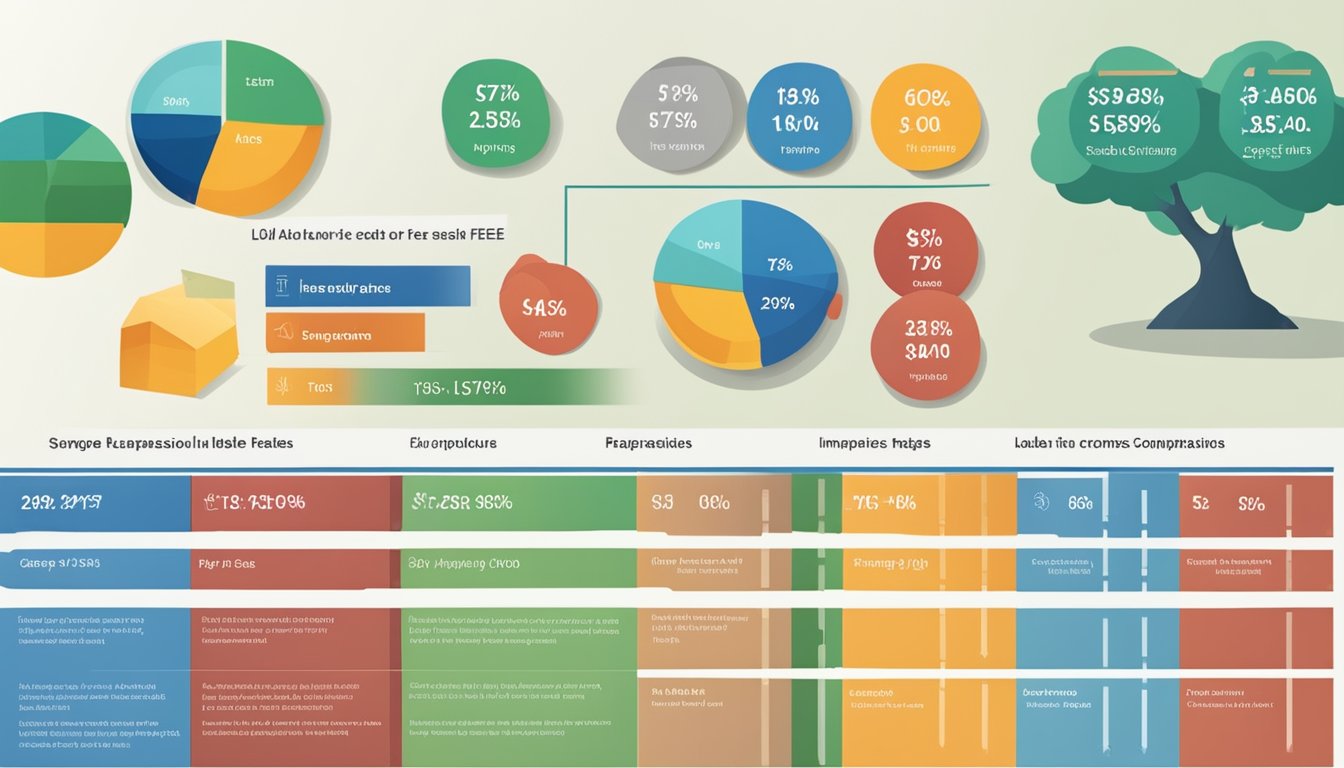If you’re looking for a personal loan in Singapore, you’ll want to compare rates to find the best deal. But with so many loan providers and interest rates to choose from, it can be overwhelming to know where to start. In this article, we’ll guide you through the process of comparing personal loan rates in Singapore so you can make an informed decision.

First, we’ll cover the basics of personal loans in Singapore, including eligibility requirements and the application process. Then, we’ll dive into the different factors that affect personal loan rates, such as interest rates and fees. We’ll also provide tips on how to select the best loan provider for your needs and offer advice on repayment and other important considerations. By the end of this article, you’ll have the knowledge you need to confidently compare personal loan rates in Singapore and choose the right loan for you.
Key Takeaways
- Understanding the basics of personal loans in Singapore is crucial before comparing rates.
- Interest rates and fees are important factors to consider when comparing personal loan rates.
- Selecting the right loan provider and understanding repayment options are key to making an informed decision.
Understanding Personal Loan Basics in Singapore

If you’re looking to borrow money in Singapore, personal loans are an excellent option. They’re easy to get, and they come with lower interest rates than credit cards. However, before you apply for a personal loan, it’s essential to understand the basics of personal loans in Singapore.
The Role of Banks and Licensed Moneylenders
In Singapore, banks and licensed moneylenders are the two primary sources of personal loans. Banks typically offer loans with lower interest rates, but they also have stricter requirements for borrowers. Licensed moneylenders, on the other hand, are more flexible with their requirements, but they charge higher interest rates.
Types of Personal Loans Available
There are several types of personal loans available in Singapore, each with its own set of advantages and disadvantages. Here are some of the most common types of personal loans:
-
Debt Consolidation Loans – These loans are designed to help you consolidate all your outstanding debts into one loan. Debt consolidation loans typically have lower interest rates than credit cards, making them an excellent option for those struggling with multiple debts.
-
Renovation Loans – If you’re planning to renovate your home, a renovation loan can help you finance your project. Renovation loans typically have higher interest rates than other types of personal loans, but they come with longer repayment periods.
-
Education Loans – If you’re planning to pursue higher education, an education loan can help you finance your studies. Education loans typically have lower interest rates than other types of personal loans, and they come with flexible repayment options.
-
Personal Loans – Personal loans are the most common type of personal loan in Singapore. They can be used for any purpose, and they come with lower interest rates than credit cards.
In conclusion, personal loans are an excellent option for those looking to borrow money in Singapore. However, it’s essential to understand the different types of personal loans available and the role of banks and licensed moneylenders in providing them. With this knowledge, you can make an informed decision about which type of personal loan is right for you.
Eligibility and Application Process

When it comes to personal loans in Singapore, there are certain criteria that you need to meet to be eligible for a loan. Here are the eligibility criteria for Singaporeans and foreigners:
Criteria for Singaporeans and Foreigners
To apply for a personal loan in Singapore, you must be a Singaporean citizen, permanent resident, or a foreigner with a valid work permit. The minimum age requirement for a personal loan is 21 years old, and you must have a minimum income of $20,000 per annum. Foreigners must have a minimum income of $45,000 per annum.
Documentations Needed for Loan Application
To apply for a personal loan in Singapore, you need to provide certain documents. Here is a list of documents that you need to submit:
- NRIC or passport
- Latest computerized payslip or income tax notice of assessment
- Employment letter or appointment letter
- Bank statements for the past 3 months
- SingPass login details
It is important to note that the documents required may vary depending on the bank or lender you choose. Some lenders may require additional documents, such as proof of residence or employment.
Once you have gathered all the necessary documents, you can apply for a personal loan online or in person. Most lenders offer online applications, which can be completed in just a few minutes. The application process typically involves filling out an online form and submitting the required documents. After submitting your application, the lender will review your application and documents to determine your eligibility for the loan.
In conclusion, when applying for a personal loan in Singapore, it is important to meet the eligibility criteria and provide the necessary documents. By doing so, you can increase your chances of getting approved for a loan and securing the best interest rates.
Interest Rates and Fees

When it comes to personal loans, interest rates and fees are two of the most important factors to consider. In Singapore, personal loan interest rates are typically advertised as either a flat interest rate or an effective interest rate (EIR). It’s important to understand the difference between these two rates and how they can impact the total cost of your loan.
Comparing Advertised and Effective Interest Rates
The advertised interest rate is the rate that is typically used to attract customers to a personal loan. However, this rate does not take into account the processing fee and other charges that may be associated with the loan. The effective interest rate (EIR) is a more accurate representation of the total cost of the loan, as it includes all fees and charges.
When comparing personal loan rates, it’s important to compare EIRs rather than advertised interest rates. This will give you a better idea of the total cost of the loan and help you make an informed decision.
Understanding Processing Fees and Other Charges
In addition to interest rates, personal loans in Singapore may come with processing fees and other charges. These fees can include administrative fees, early repayment fees, and late payment fees.
When comparing personal loan rates, it’s important to consider these additional fees and charges. While a loan may have a competitive interest rate, additional fees can significantly increase the total cost of the loan.
To get a better idea of the total cost of a personal loan, it’s important to look at the EIR as well as any additional fees and charges. By doing so, you can make an informed decision and choose a loan that best fits your needs and budget.
Remember, when it comes to personal loans, it’s important to shop around and compare rates from different lenders. By doing so, you can find a loan with competitive interest rates and reasonable fees that meets your needs.
Selecting the Best Loan Provider

When it comes to selecting the best personal loan provider in Singapore, there are several factors to consider. With so many options available, it can be overwhelming to determine which provider offers the best rates and loan terms. Here are some tips to help you make an informed decision.
Comparing Top Banks and Their Offers
Firstly, it is important to compare the rates and terms offered by the top banks in Singapore. Standard Chartered, HSBC, DBS, OCBC, UOB, and CIMB are some of the most popular banks that offer personal loans in Singapore. Each bank has its own unique features, such as low interest rates, flexible repayment periods, and instant approval.
For example, Standard Chartered’s CashOne loan is known for its instant approval, while HSBC’s personal loan is known for its low interest rates. DBS offers a range of personal loan options, including secured and unsecured loans, while OCBC’s personal loan offers competitive rates and flexible repayment periods.
To compare the rates and terms of these banks, you can use online tools and resources.
Online Tools and Resources for Rate Comparison
Several online tools and resources are available to help you compare the rates and terms of personal loans offered by various banks in Singapore. These tools allow you to input your loan amount and repayment period to see the estimated monthly repayment amount and total interest payable.
For example, Citibank’s website offers a loan calculator that allows you to compare the rates and terms of its personal loans with those offered by other banks. You can also use comparison websites such as SingSaver and ValueChampion to compare the rates and terms of personal loans offered by different banks.
In addition to comparing the rates and terms of personal loans offered by banks, it is also important to consider licensed moneylenders. Licensed moneylenders can offer competitive rates and flexible repayment periods, making them a viable option for those who may not qualify for a bank loan.
By comparing the rates and terms offered by various personal loan providers in Singapore, you can select the best loan provider that meets your needs and budget.
Repayment and Additional Considerations

When it comes to personal loans, the repayment process can be a bit overwhelming. There are many factors to consider, such as monthly repayments, loan tenure, early repayment, and cancellation fees. In this section, we will explore how to manage your monthly repayments and loan tenure, as well as how to deal with early repayment and cancellation fees.
Managing Monthly Repayments and Loan Tenure
When you take out a personal loan, you will need to make monthly repayments to pay off the loan. The amount you need to repay each month will depend on the loan amount, interest rate, and loan tenure. It’s important to choose a loan tenure that works for you, as a longer tenure will result in lower monthly repayments, but more interest paid overall.
To manage your monthly repayments, it’s important to create a loan repayment schedule. This schedule will help you keep track of your repayments and ensure that you don’t miss any payments. You can also consider debt consolidation, which involves combining multiple debts into one loan with a lower interest rate. This can help you manage your monthly repayments and simplify your finances.
Dealing with Early Repayment and Cancellation Fees
If you want to pay off your loan early, you may need to pay an early repayment fee. This fee is usually a percentage of the outstanding loan amount and is designed to compensate the lender for the lost interest. Before taking out a loan, it’s important to check the early repayment fees and factor them into your decision.
Cancellation fees are also something to consider when taking out a loan. If you decide to cancel your loan before the end of the loan tenure, you may need to pay a cancellation fee. This fee is designed to compensate the lender for the costs associated with processing the loan and may be a percentage of the loan amount or a fixed fee.
In conclusion, managing your monthly repayments and loan tenure is crucial when taking out a personal loan. It’s important to create a loan repayment schedule and consider debt consolidation to simplify your finances. Additionally, you should be aware of early repayment and cancellation fees and factor them into your decision when taking out a loan.
Frequently Asked Questions

What’s the most thrilling way to find the top personal loan deals in Singapore?
If you’re looking for the most exciting way to find the top personal loan deals in Singapore, you’ll be happy to know that there are many options available. You can start by checking out websites that compare personal loan rates from different banks. Another option is to visit the banks’ websites directly and compare their rates and terms.
How can you zestfully calculate your monthly repayments for personal loans?
Calculating your monthly repayments for personal loans can be a thrilling experience if you know what to do. You can use online calculators to get an estimate of your monthly repayments based on the loan amount, interest rate, and loan tenure. Alternatively, you can use a spreadsheet to create your own repayment schedule and track your progress.
Are there any exhilarating options for foreigners seeking personal loans in Singapore?
Foreigners seeking personal loans in Singapore have many options available to them. Some banks offer personal loans to foreigners with valid work permits and a minimum income requirement. However, the interest rates and terms may be different from those offered to Singapore citizens and permanent residents.
Which bank offers the most electrifying personal loan rates today?
The bank that offers the most electrifying personal loan rates today may vary depending on your specific needs and circumstances. It’s important to compare the rates and terms offered by different banks before making a decision. Some banks that are known to offer competitive rates include DBS, UOB, and OCBC.
How do you enthusiastically compare personal loans from DBS, UOB, and other banks?
To enthusiastically compare personal loans from DBS, UOB, and other banks, you can start by visiting their websites and checking out their rates and terms. You can also use online comparison tools to get a side-by-side comparison of different loans. It’s important to consider factors such as interest rates, loan tenure, and processing fees when comparing loans.
Can you use your CPF to make your personal loan experience in Singapore more dynamic?
Yes, you can use your CPF to make your personal loan experience in Singapore more dynamic. You can use your CPF Ordinary Account (OA) savings to pay for your monthly loan instalments. However, there are certain conditions and limits that apply, so it’s important to check with your bank and CPF Board before making any decisions.




